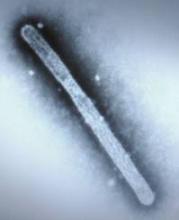Late this afternoon, the U.S. National Science Advisory Board for Biosecurity announced that it reversed its initial ruling, and will support open publication of two research articles that describe the creation of mutant strains of H5N1 avian influenza that are capable of air-borne transmission between mammals.
The new NSABB decision, which came at the end of two days of consideration of revised versions of both papers, brought the U.S. panel into agreement with a review panel convened by the World Health Organization in February that also supported full publication of the papers.
When the NSABB first reviewed the original versions of the papers last December, it decided that publication of the methods sections of the article written by Dr. Yoshihiro Kawaoka of the University of Wisconsin in Madison, and a second article written by Dr. Ron Fouchier of Erasmus Medical Center in Rotterdam, posed too much of a public health risk because of the "dual use" risk of their work. The NSABB said it feared that full disclosure of details of how these researchers produced the mutated H5N1 strains that allowed the highly pathogenic virus to spread through the air from mammal-to-mammal (in a ferret model) posed too great a danger that the information could be used in a way that endangered public health.
In its statement today, the NSABB said that "While the communication of the information in these revised manuscripts still presents dual use concerns, the additional information changed the Board’s risk/benefit calculation."
The NSABB said that it voted unanimously to recommend full publication of Dr. Kawaoka’s revised manuscript, and that it voted 12-6 in favor of full publication of Dr. Fouchier’s revised manuscript.
"The data described in the revised manuscripts do not appear to provide information that would immediately enable misuse of the research in ways that would endanger public health or national security," the NSABB said.
Although the NSABB statement did not elaborate on the nature of the revisions, Dr. Fouchier said at an open meeting in February that the mutant influenza he had produced was not as easily transmitted nor as pathogenic as initial press reports had suggested. Speaking at that meeting, Dr. Anthony Fauci, director of the National Institute of Allergy and Infectious Diseases, said that this revised information from Dr. Fouchier had led to the WHO’s decision, and prompted him to ask the NSABB to reconsider both manuscripts.
—Mitchel Zoler (on Twitter @mitchelzoler)


